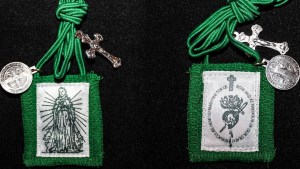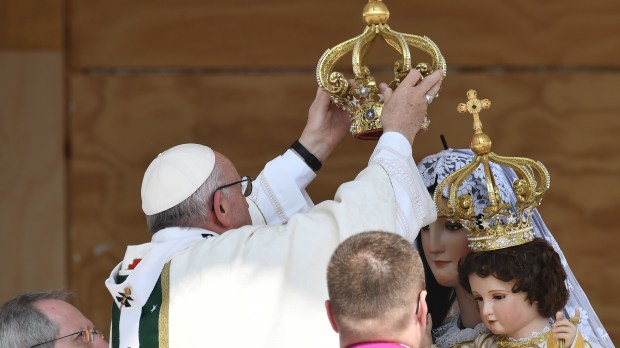Pope Francis’ visit to Chile and Peru has the Blessed Virgin Mary on center stage. During his visit he will crown two statues of Mary, venerate a third, and take part in a Marian prayer service.
While most parishes crown Mary with flowers in May, placing a real crown on her head is a much more formal process. When permission is given — or the pope decides to crown a Marian statue himself — it means the statue has proven to be important to the local faithful and usually has some miraculous history.
In Chile, Pope Francis crowned a statue of Our Lady of Mount Carmel — the patroness of Chile — during today’s Mass at Santiago’s O’Higgins Park.
Faithful sons
Chileans have a long relationship with Our Lady of Mount Carmel. In 1592 the Augustinians who came with the Spaniards spread the Catholic faith and the devotion to Our Lady of Mount Carmel. The first lay organization dedicated to Mary under this title was created in Chile in 1648.
In 1818 Bernard O’Higgins – living in exile in Argentina after a failed attempt to free Santiago from the Spaniards – and the Argentine General José de San Martin vowed their fidelity to Mary and invoked her protection before their treacherous crossing of the Andes, and later in the battle of Chacabuco. Most of their troops survived the trek across the Andes and went on to win the battle of Chacabuco on February 12, 1817.
In 1818 Chile’s civil, military and religious authorities gathered in the cathedral to once again entrust themselves to Mary’s protection. Shortly after, they won the battle of Maipu, the battle that sealed Chile’s independence from Spain.
Decades later Chilean troops fighting against Peru and Bolivia for the Atacama desert all wore the Scapular of Mount Carmel to protect them in battle. Chile won control of the desert and extended its coastline. After the war, General Manuel Baquedano placed his sword in the hands of the statue of Our Lady of Mount Carmel saying, “we owe her all our triumphs.”

Read more:
Have you ever heard of a white, blue, black or green scapular?
On January 18, in Iquique, Pope Francis will celebrate a Mass in honour of Our Lady of Mount Carmel, Mother and Queen of Chile. During the Mass he will crown a statue of Our Lady of Mount Carmel of Tirana.
Tirana is the name of a village in the south of the province of Iquique where annual Marian celebrations draw thousands of people. A hermitage dedicated to Our Lady of Mount Carmel was built in Tamarugal in the 1500s when Friar Antonio Rodon arrived in the region to spread the faith, but was surprised to discover a cross erected in a clearing in the forest. Somehow the Christian faith had already arrived in Tamarugal.
It turned out an Inca princess and priestess, Ñusta Huillac, had lived and ruled in the region with her Incan warriors. She was known throughout the region for ruling with an iron fist and a seemingly unfeeling, unbending heart. During one raid her warriors captured a foreign man, a Portuguese miner who had been led to the region on the advice of other natives. She fell in love with him on sight and used her power to delay carrying out the death sentence her tribe had ruled necessary.
She delayed his execution several months, and during that time developed a relationship with the miner. He explained his Christian faith, heaven and eternity to her. The idea of being able to be together with her beloved for all eternity warmed her heart. Finally she asked him to baptize her – but her warriors, who had been secretly watching from the forest, decided this was too big a betrayal and killed her and the miner on the spot. The cross was erected to mark the spot where they died.
Also in Chile, Pope Francis will meet with young people at the Shrine of Maipu – the national marian shrine dedicated to Our Lady of Mount Carmel The shrine was originally erected in 1818 by O’Higgins. He had promised Our Lady he would erect a shrine in her honour if Chilean troops won independence from Spain.
Door of Heaven
In Peru the pope’s first Mass in Trujillo will be in honour of “Holy Mary, Door of Heaven.” While he will not crown any statues here, the opening and closing prayers will be focused on Our Lady.
Later that same day he will lead a Marian celebration during which he will venerate Our Lady and a special litany will be sung in her honor. The litany that will be used was composed by Turibius of Mogrovejo, who was archbishop of Lima from 1579 to 1606.
Turibius was a brilliant lawyer and canon lawyer with deep, fervent faith but he was not a priest when he was appointed archbishop. His canonical protests were overruled and he was ordained a priest and then a bishop and was sent to Lima where he served for 27 years. Among the many people he confirmed during his time as archbishop was the future St. Rose of Lima.

